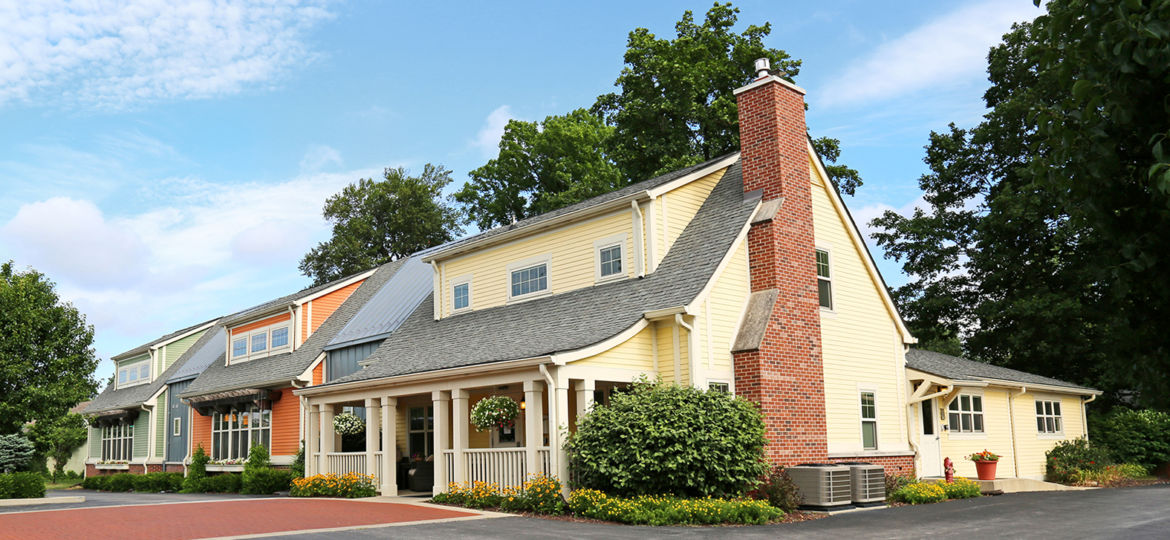
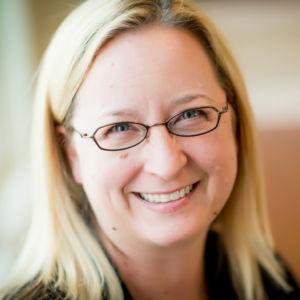
How are you doing?
This simple question is the first thing Laura Johnson, Senior Vice President of Care Services at Joy’s House, asks caregivers. The answers are often anything but simple. Many caregivers find themselves thrust into a new identity, not as themselves, but as the voice of another. For many, Joy’s House is how they care for themselves, too.
Nestled in the Broad Ripple and UIndy neighborhoods, Joy’s House’s cozy exterior looks like, well, a house. Designed to be comfortable, warm, and welcoming, the Joy’s House mission is to serve “adults living with life-altering diagnoses and their families by providing exceptional adult day and caregiver services.”
Joy’s House serves caregivers many of us don’t often think about — those providing care for adult family members or friends, who are also often caring for children, but not always.
The 42-year-old mom with three kids at three different schools and a parent with weekly dialysis appointments. Her alone time? The weekly calendar review as she plans how to juggle the kids’ various activities.
The 70-year-old wife whose husband’s dementia is growing worse. She hasn’t been to the hair salon in over a year. The last time she went, her husband took a walk and couldn’t find his way home. She doesn’t want it to happen again, but she misses the few minutes the stylist washes her hair and she experiences someone else caring for her.
The 56-year-old, full-time employed woman managing diabetes and caring for her 60-year-old older sister with mobility issues. The stress is getting to her. She’s slipping up on her medication. Her daily walks have stopped. She’s exhausted at the end of the day, and she knows it’s not helping her, but the pint of ice cream in the freezer is a daily comfort.
Maybe this person is you. Maybe this person will soon be you.
CAREGIVING BY THE NUMBERS
The odds are in your favor. A recent CDC brief explored survey results of adult caregivers in the United States. Twenty-four percent of Indiana respondents reported being adults 45 and older who cared for a family member or friend, with another 19 percent of respondents anticipating becoming a caregiver in the next two years. It is also worth noting that 1 in 4 women are caregivers compared to 1 in 5 men.
Adding to the caregiving burden is the fact that most caregivers have chronic conditions themselves. The same CDC brief cites that about 40 percent of respondents in Indiana indicated having two or more chronic conditions including COPD, arthritis, depressive disorder, kidney disease, or diabetes.
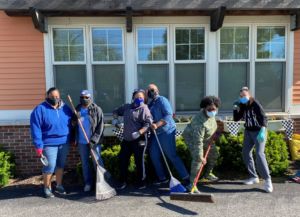
In 2020, the AARP Policy Institute presented an update on caregiving in the United States painting an increasing caregiver workload. More Americans care for more than one person and have difficulty coordinating care, and care needs for adults with Alzheimer’s and dementia have increased since 2015.
The concept of sandwich generations won’t be going away any time soon, so many women find themselves taking the bulk of caregiving work not only for their own children but also for their older friends and relatives.
A growing need for adult care is the number of individuals diagnosed with some form of dementia. “[Dementia is] by far the leading diagnosis that we’re getting,” shares Laura. She adds that Joy’s House prepares caregivers to understand that their relationship with their loved one is going to change, and dementia means they’ll have to take on a different role. Nurturing caregivers with emotional support through the progression of their loved one’s disease and allowing them to be present by taking care of themselves are the impactful ways Joy’s House cares for caregivers.
a spectrum of options
Caregivers want to engage with and provide care for adult loved ones, but they also need time for themselves and support to keep going. They need to be people outside of their caregiver roles.
When evaluating the options, they may know that a nursing home isn’t the right choice for them but may not realize the number of services that are available to support them and their loved ones.
What’s available out there?
How do you choose?
Can you afford it?
Adult day services vs. nursing homes
Is there a difference between adult day services and nursing homes? Yes.
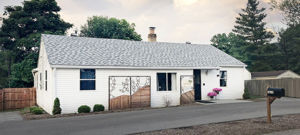
Adult day service is not a nursing home. It provides respite care — short-term relief for caregivers. Two large differences sit at the heart of the adult day service model at Joy’s House compared to nursing homes. First, clients return to their homes at the end of their visit. Second, Joy’s House provides a non-medical model of care.
Does this mean Joy’s House won’t manage mom’s medication? No. Joy’s House handles the day-to-day needs of its clients including medication and support with activities of daily living, such as eating and personal hygiene. Laura explains that while their CPR and First Aid trained team can provide support with medication, they cannot alter medications or change dosing. Likewise, clients needing support with G-tubes or catheters would need a setting different than Joy’s House.
Joy’s House provides care for adults living with life-altering diagnoses in a non-medical setting. This care goes beyond a helping hand and a shared meal. It includes celebrating holidays, inviting special guests, organizing photo shoots, offering arts and crafts, and providing a community of friends and caregivers. Laura adds that a special aspect of Joy’s House is that “The plan of care is customized to the person and the life they’ve lived prior to their diagnosis as well as who they are now.”
Obstacles that stand in the way
In an ideal world, this type of respite care would be high quality, easily available, and low to no cost for caregivers — three obstacles that the aging population and the COVID-19 pandemic have brought center stage in the last few years.
Other obstacles stand in the way, too. Caregivers may feel that it’s their duty to shoulder this burden alone.
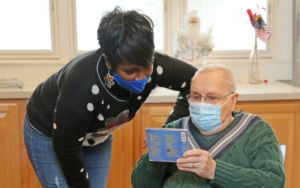
In sickness and in health, ‘til death do us part. Am I breaking this vow if she’s cared for by someone else?
No way anyone will love and care for my mom the way I do. Will she feel like I’m giving up on her?
I can’t take my eyes off of dad. He’ll wander off again. Will he be safe if I’m not there?
Where do I even start?
Laura shares that Joy’s House often connects caregivers to resources outside of what her organization offers. Resources in Indiana include Indiana Family and Social Services Administration (FSSA) INconnect Alliance and Aging & In-Home Solutions. Solutions to support nutrition, transportation to medical appointments, and emotional support for caregivers are all available.
Generous community support impacts Joy’s House’s mission and its goal to ensure that financial constraints aren’t a barrier to accessing their services. Through a scholarship program, Laura shares, most people find that adult day services are more affordable than they think.
the future of joy’s house
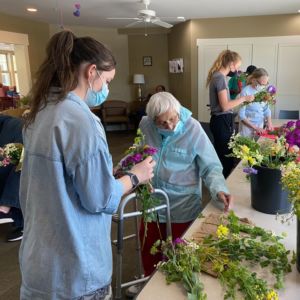
Caregiving isn’t going away, and neither are the unique needs of caregivers. So, what does Joy’s House see as the future of nurturing caregivers? The answer is twofold and Laura lights up as she shares the details.
“Caregivers’ lives are full; they need on-demand services and options,” Laura states. Joy’s House is working with community partners to bring to life a digital ecosystem — Caregiver Way — where caregivers can connect with resources, a digital community of their own, and reliable information vetted by experts. Caregiver Way is in the early stages of innovation. Prototype feedback will drive the development of the site and its continued growth. The expected launch for Caregiver Way is slated for 2023 according to Corrina Thompson, Community Relations Manager for Joy’s House.
Joy’s House also intends to support individuals, families, and caregivers through an end-of-life doula program. The program is not hospice, which manages comfort care. Instead, Laura notes that it’s about providing support for the “emotional and physical aspects of death.” Honoring the wishes and values of the person who is passing along with their family members. Later this year Joy’s House plans to engage a limited number of families in the end-of-life doula program, with community-wide expansion to follow.
caring for you
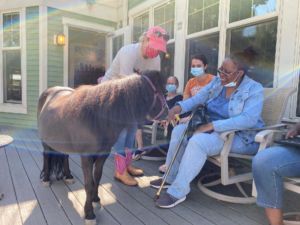
After 17 years at Joy’s House, Laura stresses that for caregivers, peace of mind and the ability to focus on themselves are the biggest benefits of the services Joy’s House provides.
Realizing you need support as a caregiver isn’t about having reached your physical limits. It’s not about being weak. It’s not about giving up.
It’s about caring for yourself as a path to caring for your loved ones, and about your identity beyond caregiving.
If you or anyone you know is in need of adult day or caregiver services, visit Joy’s House’s website or call 317-254-0828.
Una Hartzell-Baird (she/her) was voted most likely to be the person who chats you up in the grocery line. She’s an avid reader and a fierce lover of vulgar words. You can find her on LinkedIn and Facebook.
All of our content—including this article—is completely free. However, we’d love if you would please consider supporting our journalism with an Indy Maven membership.









